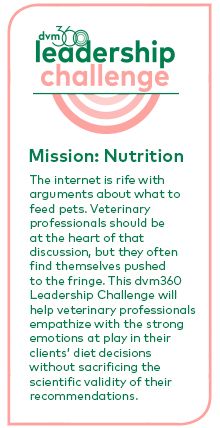The biggest pet nutrition headaches for DVMs
Did you think youd be fielding this many nutrition questions in the veterinary clinic? Neither did your colleagues, according to the 2019 dvm360 Nutrition Study.

Monika Wisniewska/stock.adobe.com
It's no surprise to anyone that in the crowded curriculum of complicated, critical topics in veterinary school, nutrition can fall down-or off-the list. Every veterinary student gets some nutrition information, but no one is expecting the average practitioner to explain the intricacies of homemade food recipes, raw food, grain-free formulations and pet food manufacturers' quality control processes. Well, no one except your clients.
If you feel a little unprepared in comparison to the millions of dollars in marketing that's flooding the pet food market to sell pet owners on brands in supermarkets and pet stores, this data from the 2019 dvm360 Nutrition Study proves you're not alone.

Don't panic, though. This is just one piece of the pie. Click on the sidebar, right, to learn more about the dvm360 Leadership Challenge, Mission: Nutrition.
Which nutrition topics did vet school fail to cover? What do you find yourself wishing you could answer for clients?
On the science
Top responses:
+ How to calculate caloric, nutritional needs for each species at different life stages
+ All the ways nutrition is different for cats
“I wish I learned that nutrition is the cornerstone of all preventive medicine and should always be addressed”
On pet food
Top responses:
+ How to read, evaluate pet food labels
+ How to evaluate, compare companies in quality and manufacturing of diets
+ Raw or homemade diets
+ How to pick a good maintenance diet
+ Grain-free diets
+ Adverse reactions to food
“I wish I learned that a complete and balanced diet is important, and the best source is a commercial diet made by a company that does adequate testing and has good quality control.”
I did learn about nutrition in vet school!
“I was given all the basics. I took a mini-course that taught the relationship of nutrients to pet health and how to recognize imbalances in the exam room.”
“I believe I was exposed to what I would need to know to discuss nutrition in an educated manner. That assumed I would pursue and develop that information further on my own and expand my knowledge base.”
“Thankfully, I took nutrition classes through the agriculture department, which should be required in every vet school.”
On misinformation
Top responses:
+ Dispelling advertising, marketing myths
+ How to combat misinformation
+ Pet label fallacies
“How many fad diets are sold on slick marketing campaigns and not sound nutritional science?”
On talking to clients
Top responses:
+ How to educate without insulting their choice of food
+ How to get clients to trust my recommendations
+ How to effectively communicate with clients about nutrition
+ How to convince owners that commercial dog food isn't bad
+ What motivates people to buy a certain type of food
+ That questions about diet would be some of the most common
“I wish I learned how to defend myself against client accusations that we get kickbacks from the big pet food companies.”
“I have a PhD in animal nutrition. I know everything I need to know except how to dissuade clients from using Whole Dog Journal to rank their pet food.”
“I wish I learned how to help clients understand that just because the food is expensive doesn't make it the best for the pet.”
Source: 2019 dvm360 Nutrition Study
